牛津译林版(2019)必修 第三册Unit 2 Natural disasters Welcome to the unit课件(共22张PPT)
文档属性
| 名称 | 牛津译林版(2019)必修 第三册Unit 2 Natural disasters Welcome to the unit课件(共22张PPT) | 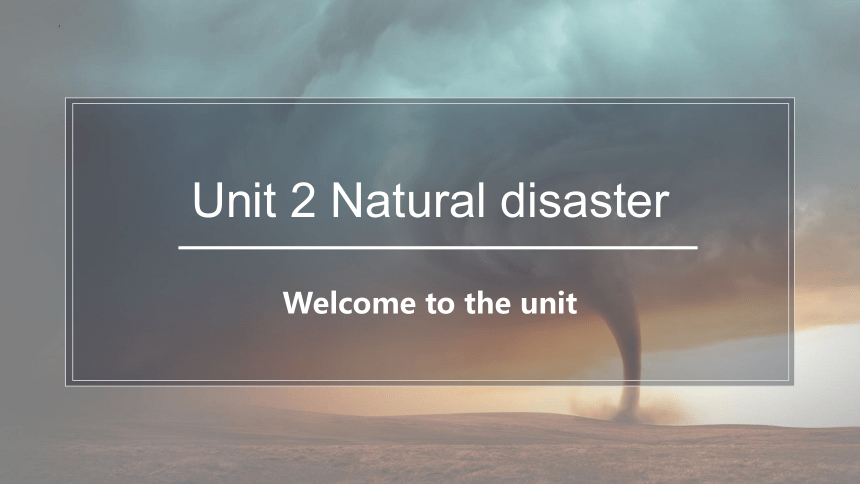 | |
| 格式 | pptx | ||
| 文件大小 | 46.4MB | ||
| 资源类型 | 教案 | ||
| 版本资源 | 牛津译林版(2019) | ||
| 科目 | 英语 | ||
| 更新时间 | 2023-07-14 07:41:25 | ||
图片预览

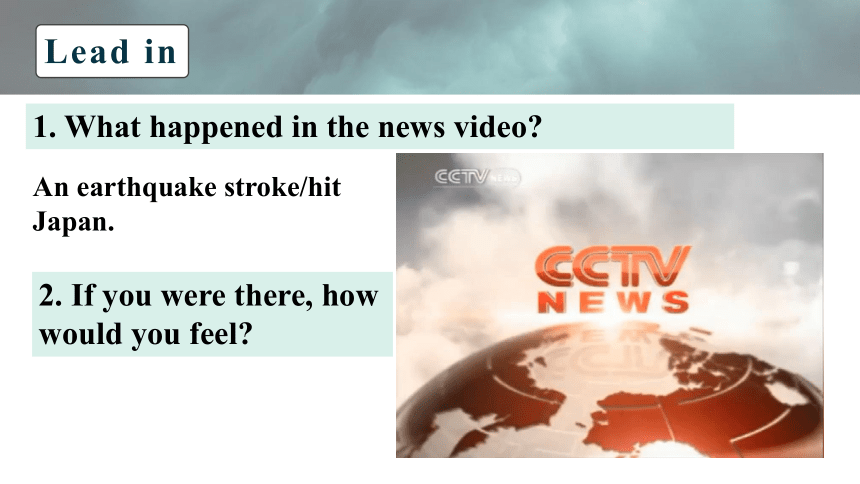
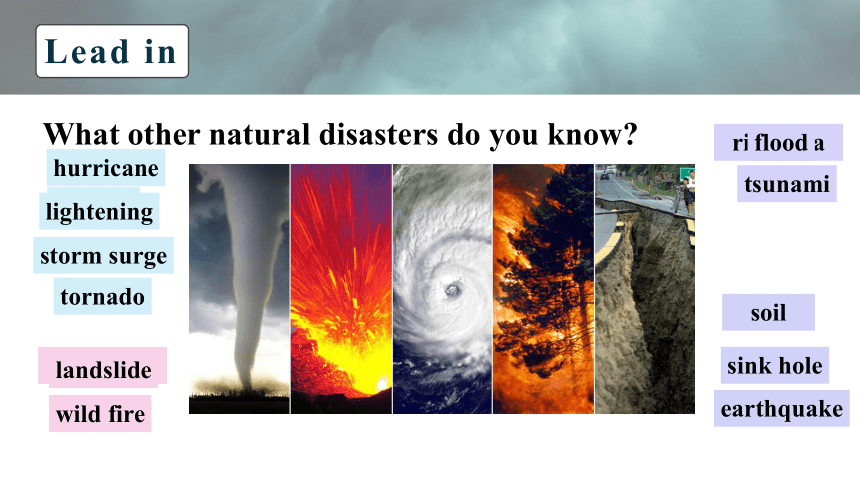
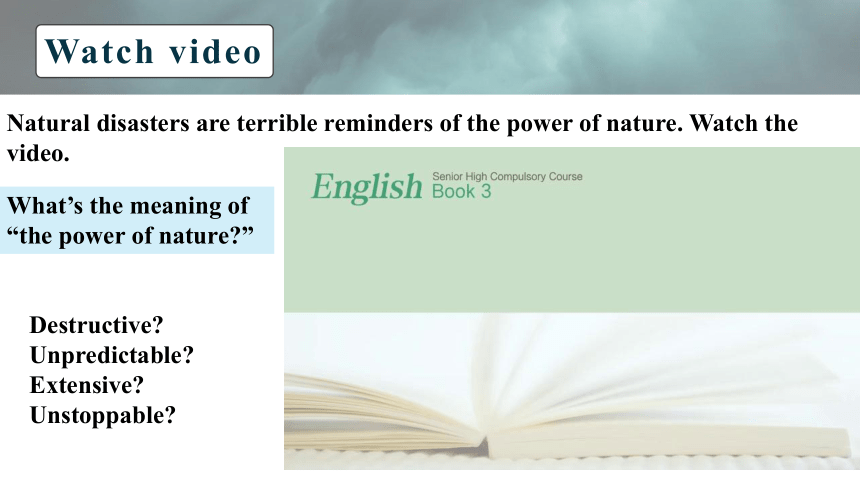
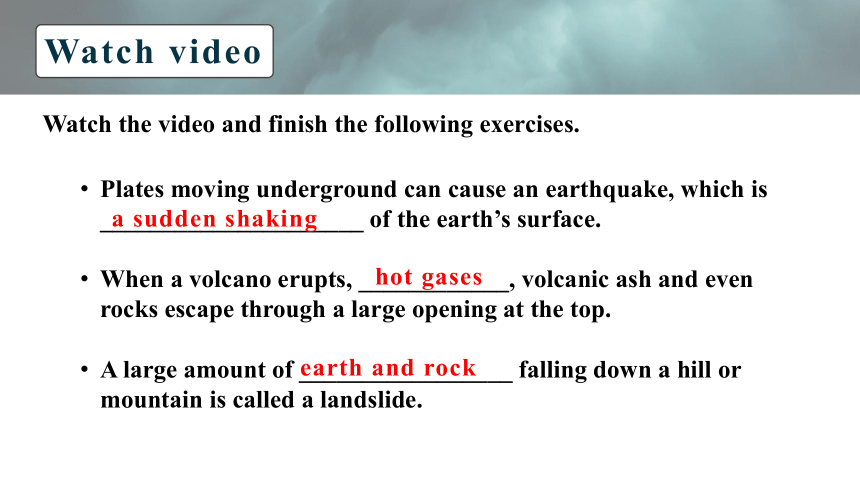
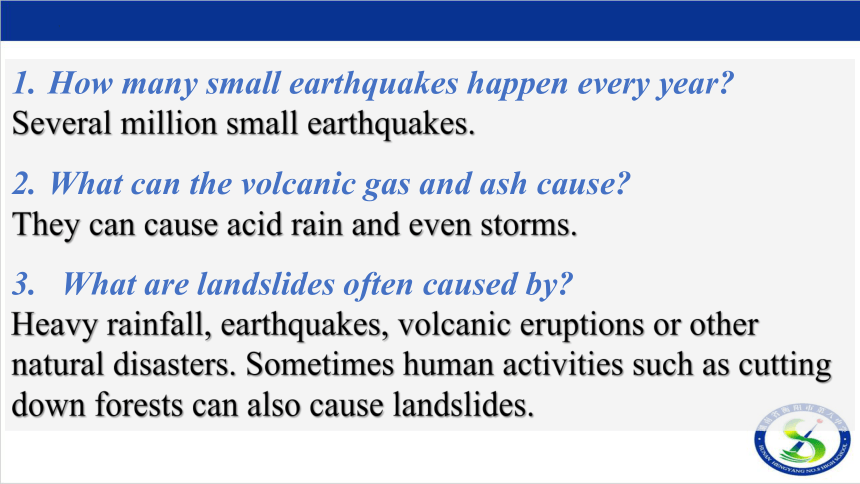
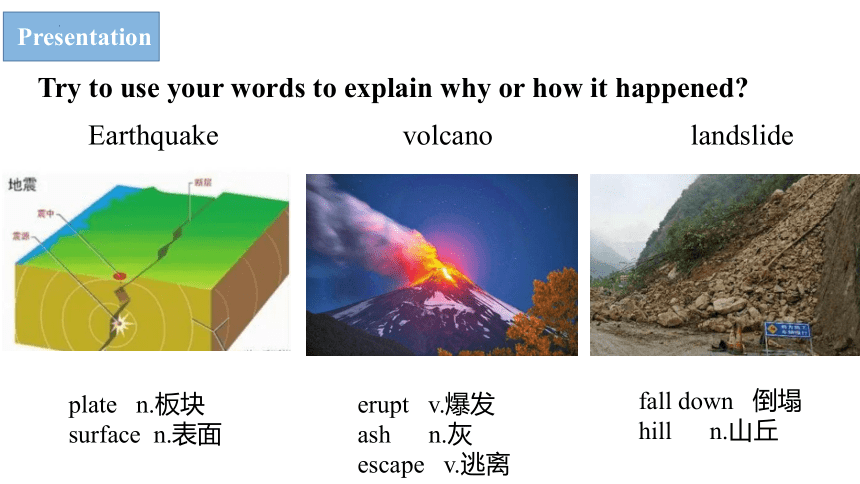
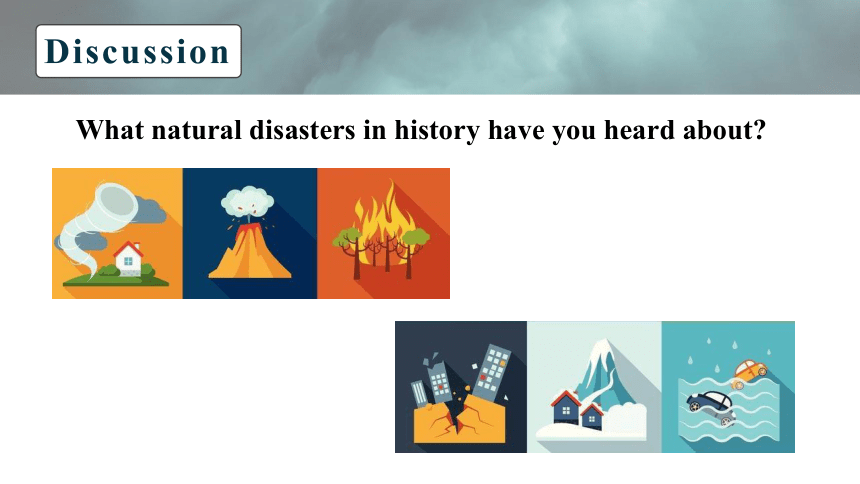
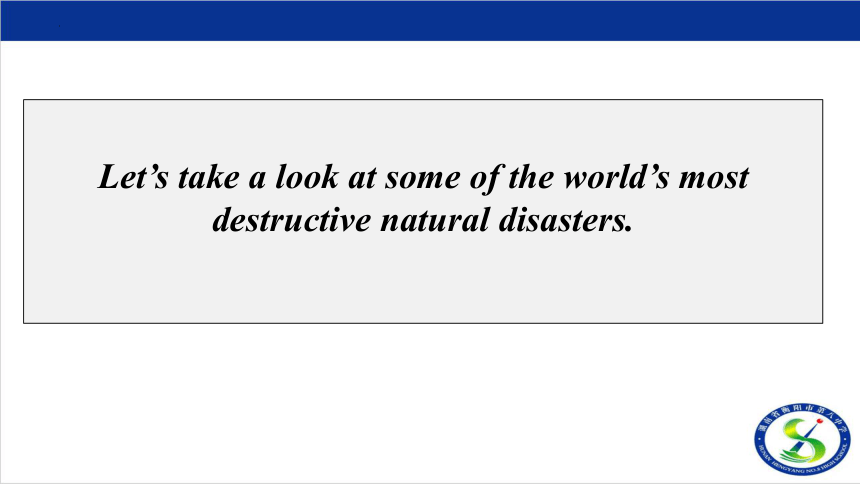
文档简介
(共22张PPT)
Unit 2 Natural disaster
Welcome to the unit
Lead in
1. What happened in the news video
An earthquake stroke/hit Japan.
2. If you were there, how would you feel
Lead in
What other natural disasters do you know
sky
mountain
soil
sink hole
tornado
landslide
storm surge
hurricane
lightening
river/sea
wild fire
earthquake
flood
tsunami
Watch video
Natural disasters are terrible reminders of the power of nature. Watch the video.
What’s the meaning of “the power of nature ”
Destructive
Unpredictable
Extensive
Unstoppable
Watch the video and finish the following exercises.
Plates moving underground can cause an earthquake, which is _____________________ of the earth’s surface.
When a volcano erupts, ____________, volcanic ash and even rocks escape through a large opening at the top.
A large amount of _________________ falling down a hill or mountain is called a landslide.
a sudden shaking
hot gases
earth and rock
Watch video
How many small earthquakes happen every year
Several million small earthquakes.
What can the volcanic gas and ash cause
They can cause acid rain and even storms.
3. What are landslides often caused by
Heavy rainfall, earthquakes, volcanic eruptions or other natural disasters. Sometimes human activities such as cutting down forests can also cause landslides.
Presentation
Earthquake
plate n.板块
surface n.表面
volcano
erupt v.爆发
ash n.灰
escape v.逃离
landslide
fall down 倒塌
hill n.山丘
Try to use your words to explain why or how it happened
Discussion
What natural disasters in history have you heard about
Let’s take a look at some of the world’s most destructive natural disasters.
2011 Tōhoku earthquake and tsunami
日本东北地方太平洋近海地震
2011 Tōhoku earthquake and tsunami
日本东北地方太平洋近海地震
It was the most powerful earthquake ever recorded in Japan, and the fourth most powerful earthquake in the world. the Japanese National Police Agency report confirmed 15,899 deaths, 6,157 injured, and 2,529 people missing. The tsunami caused nuclear accidents, primarily the level 7 meltdowns at three reactors in the Fukushima Daiichi Nuclear Power Plant complex.
Hurricane Andrew of 1993
Hurricane Andrew of 1992
Damage and economic losses
Hurricane Andrew was a Category 5 storm that hit South Florida on August 24th 1992 with wind speeds of 165 miles per hour. The storm caused damage to south Louisiana and the Bahamas, but the brunt of its impact fell on South Florida, where:
About 250,000 people were left homeless in Dade County alone.
There were 26 deaths. 25,524 homes were destroyed and 101,241 others damaged.
2008 Wenchuan
earthquake in China
2008 Wenchuan earthquake in China
The biggest earthquake struck China’s Sichuan Province on May 12, 2008. The earthquake was measured at 7.9 on Richter scale and killed about 87,000 people. It left millions of people homeless. Thousands of them were buried under the rubble of crushed communities. Factories, schools, homes were collapsed and it took troops and rescue teams significant amounts of effort to reach areas of southwestern China.
Discussion
What does disasters remind you of
the power of nature
the harm we’ve done to the earth
the cost we may pay
Discussion
Can we avoid natural disasters
1. We cannot completely prevent or predict natural disasters
but we should arm ourselves with certain knowledge.
2. Loss of life can be limited through disaster preparation.
Discussion
Nature is kind of a loving mother,but also a butcher in cold blood.
——Victor Hugo
大自然是慈爱的母亲,也是冷血的屠夫。
What’s your understanding of the quotation
Natural resource
Living space
Friendly ecological circle
Unpredictable disaster
Kill uncountable creatures
Discussion
Victor Hugo, (born February 26, 1802, Besan on, France—died May 22, 1885, Paris), poet, novelist, and dramatist who was the most important of the French Romantic writers. Though regarded in France as one of that country’s greatest poets.
Famous work:
Notre-Dame de Paris 《巴黎圣母院》
Les Misérables 《悲惨世界》
Les Contemplations 《沉思集》
Homework
1. Preview “Reading” on P16-17;
2. Finish exercise on P18-19;
Unit 2 Natural disaster
Welcome to the unit
Lead in
1. What happened in the news video
An earthquake stroke/hit Japan.
2. If you were there, how would you feel
Lead in
What other natural disasters do you know
sky
mountain
soil
sink hole
tornado
landslide
storm surge
hurricane
lightening
river/sea
wild fire
earthquake
flood
tsunami
Watch video
Natural disasters are terrible reminders of the power of nature. Watch the video.
What’s the meaning of “the power of nature ”
Destructive
Unpredictable
Extensive
Unstoppable
Watch the video and finish the following exercises.
Plates moving underground can cause an earthquake, which is _____________________ of the earth’s surface.
When a volcano erupts, ____________, volcanic ash and even rocks escape through a large opening at the top.
A large amount of _________________ falling down a hill or mountain is called a landslide.
a sudden shaking
hot gases
earth and rock
Watch video
How many small earthquakes happen every year
Several million small earthquakes.
What can the volcanic gas and ash cause
They can cause acid rain and even storms.
3. What are landslides often caused by
Heavy rainfall, earthquakes, volcanic eruptions or other natural disasters. Sometimes human activities such as cutting down forests can also cause landslides.
Presentation
Earthquake
plate n.板块
surface n.表面
volcano
erupt v.爆发
ash n.灰
escape v.逃离
landslide
fall down 倒塌
hill n.山丘
Try to use your words to explain why or how it happened
Discussion
What natural disasters in history have you heard about
Let’s take a look at some of the world’s most destructive natural disasters.
2011 Tōhoku earthquake and tsunami
日本东北地方太平洋近海地震
2011 Tōhoku earthquake and tsunami
日本东北地方太平洋近海地震
It was the most powerful earthquake ever recorded in Japan, and the fourth most powerful earthquake in the world. the Japanese National Police Agency report confirmed 15,899 deaths, 6,157 injured, and 2,529 people missing. The tsunami caused nuclear accidents, primarily the level 7 meltdowns at three reactors in the Fukushima Daiichi Nuclear Power Plant complex.
Hurricane Andrew of 1993
Hurricane Andrew of 1992
Damage and economic losses
Hurricane Andrew was a Category 5 storm that hit South Florida on August 24th 1992 with wind speeds of 165 miles per hour. The storm caused damage to south Louisiana and the Bahamas, but the brunt of its impact fell on South Florida, where:
About 250,000 people were left homeless in Dade County alone.
There were 26 deaths. 25,524 homes were destroyed and 101,241 others damaged.
2008 Wenchuan
earthquake in China
2008 Wenchuan earthquake in China
The biggest earthquake struck China’s Sichuan Province on May 12, 2008. The earthquake was measured at 7.9 on Richter scale and killed about 87,000 people. It left millions of people homeless. Thousands of them were buried under the rubble of crushed communities. Factories, schools, homes were collapsed and it took troops and rescue teams significant amounts of effort to reach areas of southwestern China.
Discussion
What does disasters remind you of
the power of nature
the harm we’ve done to the earth
the cost we may pay
Discussion
Can we avoid natural disasters
1. We cannot completely prevent or predict natural disasters
but we should arm ourselves with certain knowledge.
2. Loss of life can be limited through disaster preparation.
Discussion
Nature is kind of a loving mother,but also a butcher in cold blood.
——Victor Hugo
大自然是慈爱的母亲,也是冷血的屠夫。
What’s your understanding of the quotation
Natural resource
Living space
Friendly ecological circle
Unpredictable disaster
Kill uncountable creatures
Discussion
Victor Hugo, (born February 26, 1802, Besan on, France—died May 22, 1885, Paris), poet, novelist, and dramatist who was the most important of the French Romantic writers. Though regarded in France as one of that country’s greatest poets.
Famous work:
Notre-Dame de Paris 《巴黎圣母院》
Les Misérables 《悲惨世界》
Les Contemplations 《沉思集》
Homework
1. Preview “Reading” on P16-17;
2. Finish exercise on P18-19;
同课章节目录
- Unit 1 Nature in the balance
- Welcome to the unit
- Reading
- Grammar and usage
- Integrated skills
- Extended reading
- Project
- Unit 2 Natural disasters
- Welcome to the unit
- Reading
- Grammar and usage
- Integrated skills
- Extended reading
- Project
- Unit 3 The world online
- Welcome to the unit
- Reading
- Grammar and usage
- Integrated skills
- Extended reading
- Project
- Unit 4 Scientists who changed the world
- Welcome to the unit
- Reading
- Grammar and usage
- Integrated skills
- Extended reading
- Project
